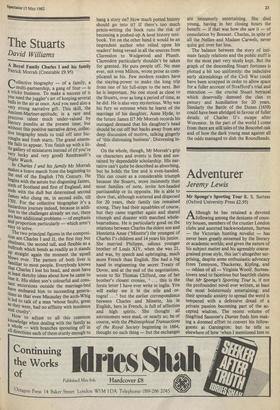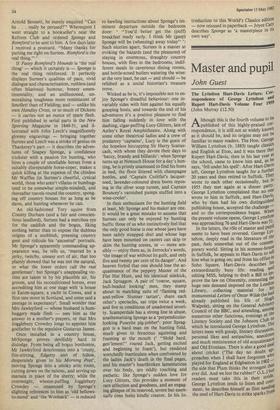Adventurer
Jeremy Lewis
Although he has retained a devoted following among the denizens of coun- try houses, members of the crustier London clubs and assorted backwoodsmen, Surtees
— the Victorian hunting novelist — has never been greatly esteemed by the literary or academic worlds; and given the nature of his subject matter and his agreeably coarse- grained prose style, this isn't altogether sur- prising, despite some enthusiastic advocacy from Tennyson, Thackeray, Kipling, and
— oddest of all — Virginia Woolf. Surtees- lovers tend to facetious but heartfelt claims that Mr Sponge's Sporting Tour is, if not the profoundest novel ever written, at least the most boisterously entertaining; and their sporadic anxiety to spread the word is tempered with a defensive dread of a private passion becoming part of the ac- cepted wisdom. The recent volume of Siegfried Sassoon's Diaries finds him mak- ing a doomed effort to convert his fellow- guests at Garsington: but he tells us elsewhere of how 'when I mentioned him to
Arnold Bennett, he merely enquired "Can he . . . really be perused?" Whereupon I went straight to a bookseller's near the
Reform Club and ordered Sponge and Romford to be sent to him. A few days later I received a postcard. "Many thanks for putting me right on Surtees. Romford is the real thing." ' If Facey Romford's Hounds is 'the real thing' — which it certainly is — Sponge is the real thing reinforced. It perfectly displays Surtees's qualities of pace, vivid dialogue and characterisation, ruthless (and often hilarious) humour, breezy unsen- timentality, and an unillusioned, un- moralising toughness more reminiscent of Smollett than of Fielding; and — unlike his own Handley Cross, or so much of Dickens — it carries not an ounce of spare flesh. First published in serial parts in the New Sporting Magazine in 1849-51, and il- lustrated with John Leech's magnificently gloomy engravings — bringing together Surtees and Leech was a stroke of genius on Thackeray's part — it describes the adven- tures of Soapey Sponge, a confidence trickster with a passion for hunting, who hires a couple of unreliable horses from a suitably disreputable horse-coper, makes a quick killing at the expense of the chinless Mr Waffles (in Surtees's cheerful, cynical world, those who aren't villains or humbugs tend to be somewhat simple-minded), and thereafter travels round the country, spong- ing off country houses for as long as he dares, and hunting whenever he can.
An old-fashioned Tory squire from County Durham (and a fair and conscien- tious landlord), Surtees had a merciless eye for the caddish and the bogus, liking nothing better than to expose the dubious origins of a snobbish, preening country gent and ridicule his 'ancestral' portraits. Mr Sponge's apparently commanding ap- pearance was, he tells us, 'marred by a jerky, twitchy, uneasy sort of air, that too plainly showed that he was not the natural, or what the lower orders call the real gentleman': but Sponge's unappealing vic- tims are taken in by his plausible air, his groom, and his reconditioned horses, even accrediting him at one stage with 'a house in Eaton-square, a yacht in Cowes, and a first-rate moor in Scotland, and some said a peerage in expectancy'. Small wonder that Mrs Jawleyford — whose husband is hum- buggery made flesh — sees him as the answer to a mother's prayers, or that Mrs Jogglebury Crowdey longs to appoint him godfather to the repulsive Gustavus James.
Once installed in a country house, MrSponge proves devilishly hard to dislodge. From being all bogus bonhomie, Mr Jawleyford deteriorates into a 'crusty, fire-stirring, fidget ty sort of fellow, desperately given to his Morning Post', moving Sponge into a smoky attic room, cutting down on the rations, and serving up marsala in place of the sherry; while the overweight, wheeze-puffing Jogglebury Crowdey — unamused by Sponge's slighting references to him as 'old bellows- to-mend' and 'the Woolsack' — is reduced
to bawling instructions about Sponge's im- minent departure outside the bedroom door: "You'd better get the (puff) breakfast ready early. I think Mr (gasp) Sponge will be (wheezing) away today" ': Such niceties apart, Surtees is a master at evoking the hazards (and the pleasures) of staying in enormous, draughty country houses, with fires in the bedrooms, indif- ferent meals in cavernous dining rooms, and bottle-nosed butlers watering the wine: at the very least, he can — and should — be relished as a social historian's treasure trove.
Wicked as he is, it's impossible not to en- joy Sponge's dreadful behaviour: one in- variably sides with him against his equally grasping hosts, and towards the end of his adventures it's a positive pleasure to find him falling suddenly in love with the dashing, cigar-puffing Lucy Glitters, late of Astley's Royal Amphitheatre. Along with some other theatrical ladies and a crew of predatory 'captains', Lucy is the guest of the hopeless hiccupping Sir Harry Scatter- cash, with whom they devote their days to baccy, brandy and billiards': when Sponge turns up at Nonsuch House for a day's hun- ting, he is primly unamused to find his hosts in bed, the floor littered with champagne bottles, and 'Captain Cutitfat's lacquer- toed, lavender-coloured dress boots repos- ing in the silver soup tureen, and Captain Bouncey's varnished pumps stuffed into a wine-cooler'.
In their enthusiasm for the hunting field at least, Mr Sponge and his maker are one. It would be a great mistake to assume that Surtees can only be enjoyed by hunting buffs: those of us who instinctively feel that the only good horse is one whose jaws have been safely strapped shut and whose legs have been mounted on casters can skip or skim the hunting scenes, or — more sen- sibly — enjoy them as, in Jorrocks's words, 'the image of war without its guilt, and only five and twenty per cent of its danger'. And heaven forbid that one should lose the ac- quaintance of the peppery Master of the Flat Hat Hunt, and his identical sidekick, Jack Spraggon. A pair of 'coarse, square, bull-headed looking' men, they stamp about in matching suits of 'flaming red- and-yellow Stunner tartan', share each other's spectacles, eat tripe twice a week, and live in conditions of unadorned severi- ty. Scamperdale has a strong line in abuse, anathematising Sponge as a 'perpendicular- looking Puseyite pig-jobber': poor Sprag- gon is a hard man on the hunting field, much given to ferocious squinting and foaming at the mouth (` "Hold hard, gen'lemen!" roared Jack, getting excited and beginning to foam'), but rendered wretchedly inarticulate when confronted by the ladies Jack's death in the final pages, and his master's heartbroken lamentations over his body, are oddly touching and pathetic: like Sponge's sudden love for Lucy Glitters, this provides a moment of rare affection and goodness, and an engag- ing glimpse of its reserved, severe but essen- tially (one feels) kindly creator. In his In-
troduction to this — now reissued in describes Sponge own way'.
World's Classics edition paperback — Joyce Car/ as 'a masterpiece in its







































 Previous page
Previous page